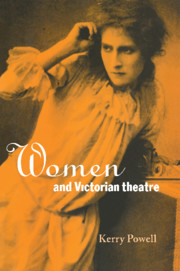4 - The impossibility of women playwrights
Published online by Cambridge University Press: 06 November 2009
Summary
I don't think any woman can succeed in writing a good play–at least they never do.
(The Life and Love of an Actress, 1888)In A Room of One's Own Virginia Woolf searches a bookshelf “where there are no plays by women,” looking for works that were “not there.” But Woolf was by no means the first to detect that there were no plays by women on bookshelves, or to hear, as she puts it, that “women cannot write the plays of Shakespeare.” These were observations that many Victorians had made already, both direcdy and indirectly, whether rationalizing an absence of plays by women – usually the purpose behind such statements – or asking, and sometimes theorizing, why women were underrepresented among dramatic authors.
The growing number of women writing plays by the end of the Victorian period was ignored in most of these discussions, and in some the exclusion of women from the ranks of acknowledged playwrights could only be inferred from what was left unsaid. Even William Archer, in The Old Drama and the New (1923), omits any notice of women playwrights – although he knew several personally – in his attempt to draw up a canon of recent English drama. The assumption noted by Virginia Woolf that women could not write good plays was so deeply rooted, therefore, that it could go unspoken and still carry force. And that assumption was probably reinforced, as Micheline Wandor suggests, by the incongruity of a woman playwright's claiming the authority to make other people speak and act when the theatre, as an institution, most often made women seem invisible, or merely glamorous.
- Type
- Chapter
- Information
- Women and Victorian Theatre , pp. 77 - 94Publisher: Cambridge University PressPrint publication year: 1997



